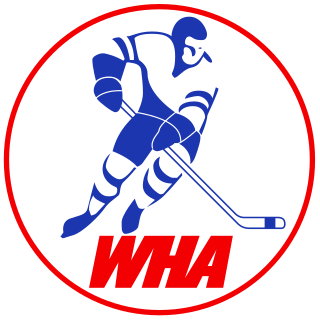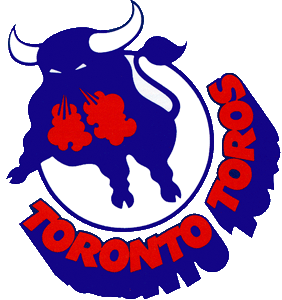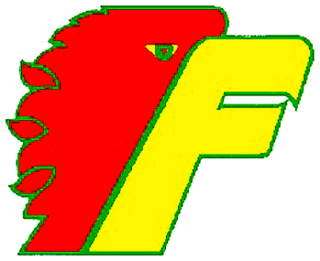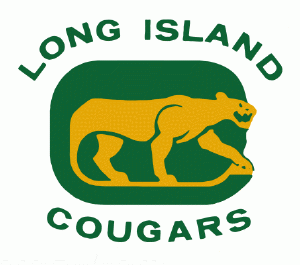
The World Hockey Association was a professional ice hockey major league that operated in North America from 1972 to 1979. It was the first major league to compete with the National Hockey League (NHL) since the collapse of the Western Hockey League in 1926. Although the WHA was not the first league since that time to attempt to challenge the NHL's supremacy, it was by far the most successful in the modern era.

The Houston Aeros were a professional ice hockey team in the International Hockey League (IHL) and the American Hockey League (AHL). The team played in Houston, Texas, at The Summit from 1994 until 2003 and the Toyota Center from 2003 to 2013. In the IHL, the team operated as an independent minor league team from 1994 to 2001, though the team occasionally accepted players on loan from various National Hockey League (NHL) clubs for development. Upon joining the AHL for the 2001–02 season, they became the primary affiliate of the one-year-old NHL expansion team, the Minnesota Wild, a partnership they maintained until the franchise's relocation in 2013. While the team's only formal partnership with the Dallas Stars was a partial affiliation agreement during the 2004–05 season, Dallas occasionally sent some of their prospects to the Aeros on individual loans from 1993 to 2005, until the establishment of the Iowa Stars gave Dallas its own primary farm team.

Ralph Gerald Backstrom was a Canadian professional ice hockey centre and later a coach, entrepreneur and hockey executive. He played in the National Hockey League with the Montreal Canadiens, Los Angeles Kings, and Chicago Black Hawks between 1956 and 1973. He also played in the World Hockey Association with the Chicago Cougars, Denver Spurs/Ottawa Civics, and New England Whalers from 1973 to 1977. With the Canadiens, he won the Stanley Cup six times, and won the Calder Memorial Trophy as the NHL's rookie of the year in 1959. After retiring he served as head coach of the University of Denver Pioneers for several years in the 1980s.

The Chicago Cougars were a franchise in the World Hockey Association from 1972 to 1975. The Cougars played their home games in the International Amphitheatre. During the 1974 Avco Cup Finals against Gordie Howe and the Houston Aeros, the team's two home games were played at the Randhurst Twin Ice Arena in suburban Mount Prospect. This was because a presentation of Peter Pan starring gymnast Cathy Rigby was booked into the Amphitheatre when the National Hockey League's Chicago Blackhawks and the National Basketball Association's Chicago Bulls had both entered their own playoffs, making the Chicago Stadium unavailable for either the Cougars or Peter Pan.

The Houston Aeros were a professional ice hockey team in the World Hockey Association (WHA) from 1972 to 1978.

The Michigan Stags were a professional ice hockey team based in Detroit that played a portion of the 1974–75 season in the World Hockey Association. On January 18, 1975, the team folded, but the league immediately took over operation and moved the franchise to Baltimore where it was known as the Baltimore Blades. The Stags originated as the Los Angeles Aces, but were renamed the Los Angeles Sharks before their first game, one of the WHA's original twelve teams. The Stags played at Cobo Arena, and the Blades at the Baltimore Civic Center.

The Toronto Toros were an ice hockey team based in Toronto that played in the World Hockey Association from 1973 to 1976.
The 1978–79 WHA season was the seventh and final season of the World Hockey Association (WHA). Prior to the start of the season, the Houston Aeros folded leaving seven teams to start the season. Only six would finish however, as the Indianapolis Racers folded after 25 games on December 15, 1978. The remaining six teams each played 80 games, including one game each per team against a Soviet All-Star squad and the Czechoslovakian National Team, the second consecutive year for this arrangement. The Soviet team won four of their six games and tied another; the Czechoslovak team only won once and tied once against four losses. In addition, because the Racers had folded after playing an odd number of games, the Edmonton Oilers played the Finnish National Team once at home so as to allow each of the six surviving WHA teams to play 80 regular season games. The Oilers won by a score of 8-4, a result which in itself made no difference by the end of the regular season which Edmonton won by an eleven point margin over the Quebec Nordiques.
The 1975–76 WHA season was the fourth season of the World Hockey Association. After the Baltimore Blades and Chicago Cougars folded, the league stayed at 14 teams by adding the Cincinnati Stingers and Denver Spurs. In addition, the Vancouver Blazers franchise moved to Calgary and became the Cowboys. Midway through the season, the Spurs moved to Ottawa and became the Civics, though the team folded shortly thereafter when the sale of the franchise fell through. The Minnesota Fighting Saints became the second team to fold mid-season when the franchise was not financially successful, despite having a winning record at the time. Theoretically, fourteen teams would play 80 games each, but only twelve teams finished the season, with cancelled games involving the Civics or Saints being rescheduled on the fly, and four of five Canadian Division teams played 81 games, as a result.

The Philadelphia Firebirds were a minor league professional ice hockey team that played in Philadelphia, Pennsylvania, from 1974 to 1979, and later the franchise moved to Syracuse, New York, and played one final season as the Syracuse Firebirds. From 1974 to 1977 the Firebirds were a member club of the North American Hockey League. The Firebirds won the Lockhart Cup as NAHL playoff champions in 1976. When the NAHL folded in 1977, the Firebirds then played the American Hockey League from 1977 to 1980.
The 1973–74 Quebec Nordiques season was the Nordiques second season, as they were coming off a 33–40–5 record, earning 71 points, failing to qualify for the playoffs in their first season.
The 1972–73 Ottawa Nationals season was the Nationals' only season, as they were one of the original teams in the newly created WHA. The Nationals played most of the season in Ottawa, but transferred their playoff games to Toronto. Due to low attendance in Ottawa, an arena lease dispute, and much better attendance in their two playoff games in Toronto, where they averaged over 5000 fans per game, the Nationals relocated to Toronto permanently beginning in the next season. The club was renamed the Toronto Toros.
The 1979 NHL expansion was the culmination of several years of negotiations between the National Hockey League (NHL) and the World Hockey Association (WHA) that resulted in the WHA and all of its surviving franchises folding in return for the owners of four of the WHA's six remaining teams being granted expansion franchises that commenced play in the NHL for the 1979–80 season. The agreement officially took effect on June 22, 1979. The agreement ended the seven-year existence of the WHA and re-established the NHL as the lone major league in North American professional ice hockey.
The 1973–74 New England Whalers season was the second season of the Whalers' franchise. The Whalers qualified for the playoffs for the second-straight season to attempt to defend their championship. They were defeated in the first round by the Chicago Cougars.
The 1973–74 Los Angeles Sharks season was the Los Angeles Sharks' second and final season in Los Angeles in the World Hockey Association. The club finished last in the WHA Western Division and missed the playoffs. They moved to Detroit, MI after the season and became the Michigan Stags.
The 1974–75 Chicago Cougars season was the Chicago Cougars third and final season of operation in the World Hockey Association (WHA). The Cougars finished third in the East, but did not have enough points to qualify for the playoffs.

The Long Island Cougars were a minor league professional ice hockey team that played at the Long Island Arena in Commack, New York, from 1973 to 1975. The Cougars were a member of the North American Hockey League, and were runners up for the Lockhart Trophy to the Syracuse Blazers in the 1973–74 season.









